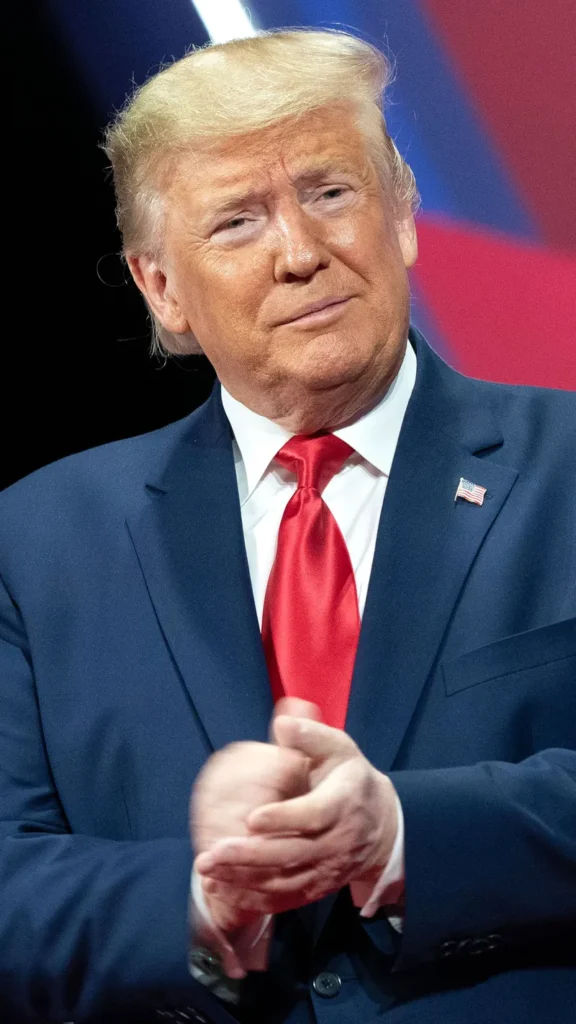Donald Trump served as the 45th President of the United States from 2017 to 2021. Before diving into the world of politics, Trump built his career as a real estate developer and organizer.
More about Donald Trump
Like the man himself, Donald Trump has a diverse and vibrant family. The 45th President of the United States has three marriages under his belt, and his lineage includes prominent businesspeople, glamorous people, and political activists.
Donald trump first marriage, which lasted from 1977 until 1992, was to Ivana Trump. Three children were born into the union: Eric, Ivanka, and Donald Jr. Each of them has left their imprint in different capacities, exploring the business and, in Ivanka’s case, even dipping their toes into politics.
In 1993, after he and Ivana parted ways, Trump married Marla Maples. Sadly, their marriage disintegrated in 1999, but not before Tiffany Trump, their daughter, was left as a legacy.
When Donald Trump married Melania Donald Trump in 2005—a former Slovenian model who would go on to become the First Lady of the United
https://people.com/tag/melania-trump/
States when Donald Trump took office in 2017—the third time really did prove to be the charm. They welcomed their son Barron into the world together. https://Donaldtrump.com
With businesses in real estate, fashion, and even reality TV, the Donald Trump family never fails to draw attention from the general public. One thing is obvious, despite all of the scandals and complexity that come with living in the public eye: the Donald Trump family is a powerful force that has left an enduring impression on the landscape of contemporary America.
“Biden vs. Trump:
“Hey there,
Who is Donald Trump Number 1?
So, here’s the scoop: the big Election is rolling around again in America, set for 2024. The deal is simple – support the one who’s proven their worth in the past or is hustling hard right now.
Ultimately, it’s in the hands of the people of America, and I’m optimistic that we’ll collectively make the best choice.
Donald Trump
Mark your calendars for Tuesday, November 5th, 2024.
If we pick the best candidate once more, we’re counting on America to deliver the best for its people.
Imagine if Trump clinches the win; he’d be the second term president. Naturally, folks will expect even more than what went down in his previous stint.
Political scientist Graham Allison wrote “Essence of Decision,” a provocative critique of the Kennedy administration’s handling of the Cuban Missile Crisis, in 1971. His main point was a divergence from the accepted wisdom that says foreign policy choices are only logical reactions to outside circumstances.
Rather, Allison argued, these choices were complex political results, similar to strategic “games” among different government actors.
Even in the domain of foreign policy, where the US president has significant power, decision-making is a team endeavour. The president must negotiate with advisors, military people, cabinet secretaries, and diplomats—all of whom have opposing agendas and points of view—in order to obtain assistance.
Not everybody was a fan of Allison’s hypothesis. Early on in the book’s review cycle, realist international relations specialist Stephen Krasner rejected the analysis. Because it neatly hid their responsibility for decisions, he thought it would be well received by influential policymakers. In the end, the president is the only one who makes decisions about U.S. foreign policy, according to Krasner, even though there may be games played inside the president’s inner circle. He contended that even in situations where staff and bureaucrats play games, the president sets the rules and chooses the participants.
Realizing that Donald trump is limited to one more term in office, his supporters in the political sphere have shifted their focus beyond merely promoting his single term. One of the key figures in Trump’s early days, his chief strategist Steve Bannon, introduced the idea of the “deconstruction of the administrative state.” Though it may sound revolutionary, this idea is consistent with conservative objectives that date back to the New Deal era of Franklin D. Roosevelt.
Of course! Independent regulatory agencies are vested with a wide range of important responsibilities by Congress, and they play a crucial role in directing and forming important facets of the US government. This is an explanation:
1. Protecting the Environment (EPA): The mission of this organization is to protect and enhance the environment of the country. They are essential in establishing and implementing regulations concerning hazardous waste disposal, water and air quality, and other environmental protection measures.
2. The second is the Consumer banking Protection Bureau (CFPB), which is dedicated to safeguarding customers in the banking industry. Fair financing, financial transparency, and accountability are some of the topics it covers. In order to guarantee that customers receive correct information and are treated properly by financial institutions, the bureau works.
3. The National Labour Relations Board (NLRB) is responsible for supervising the rights of both employers and employees, specifically with regard to labour union activity and collective bargaining. It handles unjust labour practices and holds elections to see whether employees wish to be represented by a union.
Every one of these organizations is essential to preserving the integrity and balance of the several sectors that make up the US. They are made to guarantee that rules and regulations are followed for the protection and well-being of the American people, as well as to solve certain issues.
